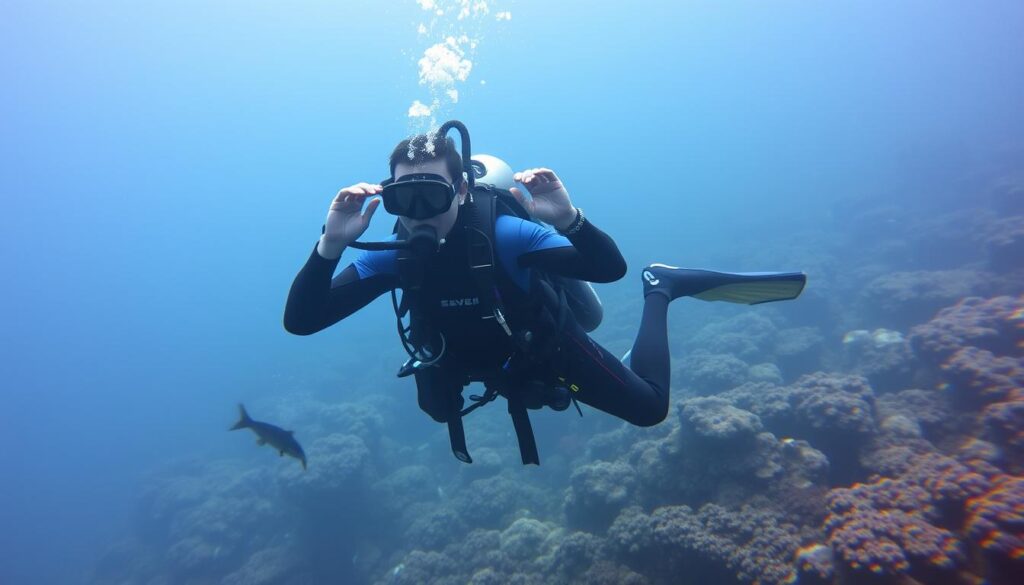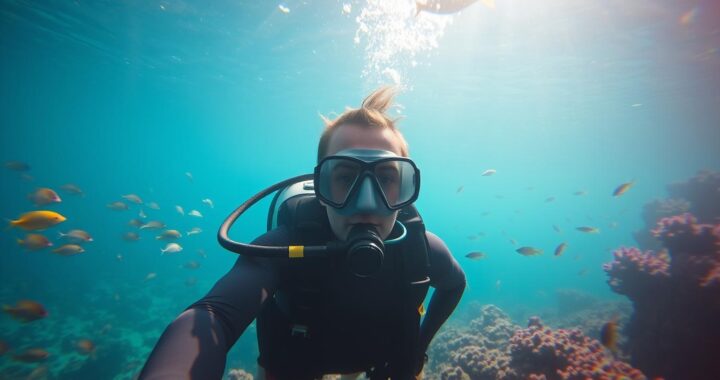Scuba diving lets you see and explore a whole new water world. This guide is for new divers to help you learn safely and confidently. It covers everything from basics to respecting sea life. Your underwater adventure begins here.
Key Takeaways:
- Scuba diving provides an exciting way to explore underwater environments.
- Beginner scuba diving guide to help you start your underwater adventures.
- Learn to scuba dive with confidence and proper preparation.
- Understand the scuba diving basics for beginners for a safe experience.
- Respecting marine life is crucial for responsible diving practices.
Getting Started with Scuba Diving
Starting your first scuba dive needs the right prep and know-how. It’s key to learn scuba diving basics first. Picking a beginner course makes diving safe and fun.
Overview of the First Diving Experience
The first dive mixes excitement with a bit of fear. Places like Deep Blue Dive Center offer full training. They help you get used to gear and basic skills with expert teachers.
Choosing a Beginner Diving Course
Looking for a beginner course? Try PADI’s Discover Scuba Diving or Open Water Diver. These programs teach diving basics and safety. You learn key skills, like how to breathe underwater and talk. Picking a good course gives you top-notch teaching and real dive practice.
| Course | Description | Duration |
|---|---|---|
| Discover Scuba Diving | Introductory dive with basic skills and underwater experience. | 1-2 days |
| Open Water Diver | Comprehensive course covering theory, confined water dives, and open water dives. | 3-4 days |
Starting with a good beginner course ensures a safe and great beginning to diving.
Essential Scuba Diving Equipment for Starters
Beginners must learn about their gear for safe and fun dives. Whether it’s your first dive or you’re improving, choosing and caring for your gear is important. This guides you in your scuba journey.
Basic Gear Overview
Your dive kit has a mask, snorkel, fins, wetsuit, BCD, regulators, and tanks. Good equipment is key for safety and comfort under water. A well-fitted mask lets you see clearly, and a reliable snorkel helps you breathe at the surface. Fins aid your movement, and a wetsuit keeps you warm and buoyant.
Choosing the Right Gear
Comfort and fit are crucial when picking gear. Start with basics like a mask and fins for your first dives. Renting lets you try various items to find what works best. As you get better, buy gear that fits your needs to improve your diving.
Maintaining Your Equipment
Good maintenance keeps your gear in top shape and ensures it works well. Wash everything with fresh water after diving. Keep everything in a cool, dry spot away from the sun. Check your BCD and regulators often for damage. Taking care of your gear helps avoid problems during dives.
Scuba Diving Basics for Beginners
Learning scuba diving basics for beginners is key to have fun and stay safe underwater. This beginner scuba diving guide talks about the main points. It helps new divers feel okay under the water.
Breathing right is super important for controlling how you float. Breathe slowly and deeply to move up and down easily. This makes your dive go well. It’s good to practice this in a safe place first.
Knowing how to clear your mask is also important. Sometimes water gets into your mask. You need to know how to get it out without going up. Try this in shallow water to get better and feel good with your gear.
Using your fins the right way is another big point in this beginner scuba diving guide. Use your fins in a strong but careful way to move and save energy. The right way to use your fins keeps the water clear. This makes diving more fun.
Being good with your gear and knowing hand signals are big steps in being a great diver.
Knowing pre-dive safety checks and planning well is key to avoid problems. Always check your gear before a dive. Talk about the dive plan with your buddy. Know the place you’re diving in. This makes sure you have a safe and fun dive.
Underwater Safety Tips
Safety comes first for all scuba divers, no matter if you’re starting or have lots of experience. Following underwater safety tips makes your diving trip safe and fun. It builds your confidence and lowers dangers. Knowing and using important rules can make diving better and safer for everyone.
Importance of Safety Measures
Divers must stick to safety rules to avoid accidents underwater. Dive within what you know and with a partner. This cuts down on emergencies. Having essential scuba diving skills is key for a safe dive. This includes how to go up and down correctly and manage your buoyancy.
Frequent Hand Signals
Talking under water is key for safety. Knowing common hand signs helps everyone understand each other. This means teams work better and respond fast if there’s trouble. Basic signs show who is who, when to go up, and if air is low. Mastering these signs is a must-do essential scuba diving skill.
Monitoring Air Supply
Always checking your air is crucial. Don’t run out of air underwater. Keep an eye on your air, plan your dive well, and tell your partner how much air you have. Getting back safely depends on watching your air closely.
- Adhere to depth and experience limits.
- Always dive with a buddy.
- Learn and use frequent hand signals.
- Regularly check your air supply.
In the end, mixing underwater safety tips with your essential scuba diving skills makes diving much safer and more fun.
Introduction to Scuba Diving
Diving into the world of scuba is exciting but can seem scary too. An introduction to scuba diving is key to feeling sure and safe underwater for new divers.
Overcoming Fear and Building Confidence
Being scared at first is common for new divers. To beat this fear, learning about the gear and practicing in a pool is important. This helps you feel ready before diving in the ocean.
Having a friend to dive with and getting cheers from teachers are also big helps. By taking things slow, fear turns into excitement for exploring the sea.
The Role of Breathing Techniques
For beginners, knowing how to breathe right is super important. Breathing slow and deep keeps you floating right and calm. This makes you use less air and feel less worried underwater.
Good breathing lets you dive longer and safer. It’s also a way to stop lung injuries that new divers might face. Starting with these skills makes diving a better experience.
To really get good at diving, think about joining a class like PADI Discover Scuba Diving. It gives you direct learning and practice.
Essential Scuba Diving Skills
Learning key scuba diving skills is key for safety and fun underwater. By getting these skills right, you dive better and enjoy more. Let’s look at important skills every diver must know.
Mastering Neutral Buoyancy
Achieving neutral buoyancy is super important. It lets divers stay in place in the water. You won’t sink or float away. This skill needs practice and knowing your scuba diving equipment for starters. This includes your buoyancy control device (BCD).

Clearing Your Mask
Removing water from your mask is a must-do. It’s a big part of essential scuba diving skills. Doing this right means you can see clearly underwater. This makes diving safer and more fun. Having the right scuba diving equipment for starters helps a lot here.
Using Your Fins Efficiently
Using fins well is crucial. It saves energy and helps you move better underwater. Good finning means easy moving and less tiredness. It’s a big part of essential scuba diving skills. Choosing the right scuba diving equipment for starters matters a lot. This includes picking the best fins for you.
Diving Techniques for Beginners
Exploring underwater is thrilling, especially with basic diving skills. First, learn to watch everything around you. This means looking at other divers, how deep you are, and how much air you have left.
Next, know how to find your way. Beginners learn to use the sea’s landmarks and compasses. Practicing in a safe place helps them get better at moving under the sea.
It’s important to go up and down in the water the right way. Doing this smoothly keeps you safe from sudden pressure changes. Watch your buoyancy and breathe properly to move gently.
Learning with a good teacher makes a big difference. You’ll practice putting diving gear together and controlling your buoyancy in safe water. To get better, think about taking a beginner’s diving class. It’s a great way to learn more and get ready for the sea.
Tips for a Successful Dive Trip
Planning a great dive trip is about more than just jumping in the water. You need to think about a lot. This means careful dive planning, looking at different conditions, and taking care of your gear afterwards.
Planning Your Dive
Knowing your dive location well is key to a good plan. Study the dive site before you go. Look into the water’s movements, and watch out for anything that could be risky. This way, divers are ready and can fully enjoy seeing what’s underwater.
Conditions and Considerations
Don’t forget to check the weather before you go. Bad weather can make diving tough. Think about the water’s warmth and how clear it is too. These make a big difference in how much fun you have. Talking with local divers can give you tips and tell you the best dive spots.
Post-Dive Care
Looking after your gear is just as crucial as the dive. After you come up, clean your equipment. This stops it from getting damaged. Keeping a dive log shows what you’re good at and what to work on next. Also, chatting with dive groups is a great way to share advice.
Here are some key things to do after diving:
- Rinse equipment with fresh water.
- Dry the gear completely before storing it.
- Log your dive experiences to track progress.
- Engage with local dive communities for tips and insights.
| Checklist | Remarks |
|---|---|
| Inspect equipment for damage | Ensure all parts are functioning properly |
| Record dive details | Helps in tracking diving techniques for beginners |
| Engage with dive community | Gain insights on local sites and practices |
Conclusion
Diving is not just about seeing underwater stuff. It’s a big adventure from the start. You learn the basics and pick the best course. You also need the right gear and skills to enjoy diving. This guide helps new divers get ready for fun times underwater.
Being safe is super important in diving. You must know how to stay safe and use hand signals. It’s also key to keep an eye on how much air you have. Then, you can work on getting better at diving and taking care of your equipment.
When you’re learning to dive, it’s big to beat any fears and get good at important things. Like staying balanced in water and using your fins right. Diving is about enjoying the sea life and caring for the ocean. If you keep learning and stay safe, the sea has endless cool things to show you.
